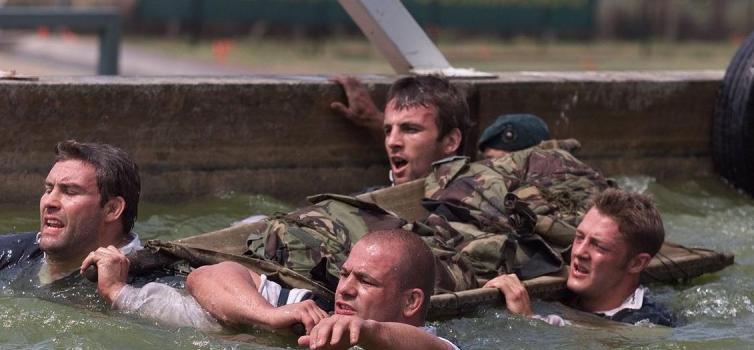How the Marines helped England win the World Cup

England trained with the Marines shortly before the 1999 Rugby World Cup
Written by Simon Austin — May 23, 2017
SIR CLIVE WOODWARD says training with the Marines was key to his side winning the 2003 Rugby World Cup.
The squad spent time with the elite amphibious force in the run-up to the 1999 tournament, but Woodward says there wasn't enough time for their lessons to take effect. His side suffered a heavy loss to South Africa in the quarter-finals.
Four years later, it was a different story, as the Marines culture had really taken hold within the England set-up.
Woodward remembers a senior Marine trainer telling him: “Ok, if you want to hear it, there are men in your squad who we wouldn’t go into battle with. It’s not about their skills, it’s about their attitude and effect on the team.
“In high-pressure combat situations just one negative trait can destroy a whole team. One wrong team player can sap the energy from the whole group.”
Woodward began to implement their recommendations as soon as the 1999 tournament had finished.
“After the World Cup the energy sappers were all sorted out,” Woodward remembers. “Some I managed to turn around. In every case none of them had actually realised that what they’d been doing behind the scenes could cause so many problems.
“England arrived at the World Cup with a 30-strong team of energisers plus another 20 at home hoping to take part.”
Brian Ashton, who led England to the 2007 World Cup final, took his squad to train with the Special Boat Service in the run-up to the tournament.
He told TGG: “One of my top experiences was taking the 2007 squad to Poole for three days with the SBS. The modern military and top level sporting environments have much in common, although it is obviously more important that they get things right more often!”
His players thought they were flying to Faro in Portugal when, without warning, they were ordered back on the bus and driven to Poole for a three-day exercise. One of the exercises was to enter the pitch-black, smoke-filled hold of a ship to recover trapped bodies.
"They lived the life of a Royal Marine and slept under canvas for three nights,” Ashton says. “The Marines gave me a full debrief on each player every day and were very perceptive. Since we returned we constantly chipped away and reminded them how they coped in what were pretty hostile surroundings.”
Former Royal Marine Commando JJ Chalmers is convinced that the organisation’s culture of teamship and leadership works - because it saved his life.
“I was on my back, my face was crushed, looking out of one eye,” he told TGG. “I was in a bad way, thinking there’s nothing I can do for myself. My arms had been blown off, so I wasn’t putting a bandage on myself.
“Literally the only thing I could do was hope somebody was coming to help me. Out of the dust cloud came my friend, who jumped on top of me and started saving my life. Meanwhile, another lad was on the radio getting the helicopter in. The system clicked in and it all started happening.

READ MORE: Brian Ashton, a different kind of coach
“Nothing could prepare me for getting blown up – truly how horrendous it was, fucking horrible - but that was when it counted, all those speed marches, being cold, wet and miserable.
“On any other given day, we would have hunkered round one of the lads and got him off the battlefield. He had a cut on his head and a bit of concussion. But he picked himself up, looked around and cracked on, patching guys up. He had to put the lives around him above his.
“It was about 28 minutes before a helicopter came and it was non-stop patching guys up, carrying on stretchers. They were exhausted, carrying me the 50 metres to a helicopter on a stretcher.
“They had nothing left in the tank but knew this is it, my mate is going to die if I don’t keep going.”




-1.png)





